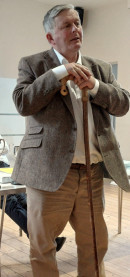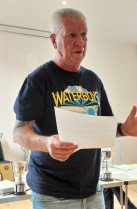Keeping the dialect poetry flag flying at Morpeth's Northumberland Gathering

Morpeth’s Northumberland Gathering is all about tradition: maintaining the county’s music, dance, crafts, folklore, dialects and customs at an annual three-day festival in the town.
And Eileen Beers is a firm believer in keeping up tradition. After all, she won the overall dialect spoken word trophy at the Gathering for the fourth time in a row on Saturday.
She says: “I live in Morpeth and my interest is keeping our dialect alive. I write and perform dialect poetry using the old Morpeth words that are slowly dying out.”
Eileen’s two poems that won over the two judges, including renowned Northumberland poet Katrina Porteous, were short and funny, and were about an unwanted but practical Christmas present that has stood the test of time, and a mix-up over the purveying of window blinds.

Graham opened the reading with his poem ‘In the bleak pitwinter’, a moving, powerful rendition of mining life and its “work and dark and danger”, with lines that included “red tab ends glow like fireflies” and a sympathetic nod to the miner’s wife who “needs the man, she needs his labour” as “she stoops to lace his boots”.
In the same vein, he contributed a moving song, ‘Ghosts of Northumberland’, about “hard living ’tween the Tweed and the Tyne … the collieries are gone, but the memories remain”. A well-known local performer, he had taken part in a fund-raising concert for the Gathering a month earlier.

Reading his short story ‘Ghosts of Druridge’ he said: “We used to think it was wor beach, and in times gone by it was.” Describing the “yellow brick houses, the outside netties”, the gathering of sea coal, and a childhood that included the picking up of spent bullets jettisoned by wartime Hurricanes and Spitfires, he painted a vivid, observant and loving picture of life just a few decades ago, gathering round ‘Wor coal fire’ that included chopped-up pit props.
You may be assured that both Graham and John garnered accolades in a number of categories. Indeed, it was difficult for an incomer like me to keep track at times.
The final category showcased at the reading was one for the telling of tall tales. Graham triumphed, with the aid of a pair of maracas, insisting that the shakers were preceded in history by the Northumbrian ‘waknackers’ – I hope I’ve spelt that correctly. It was a suitable way to end the reading, and to emphasise that tradition is important – but you can have a laugh about it all as well. Cue Eileen Beers, and her poetic punchlines.




